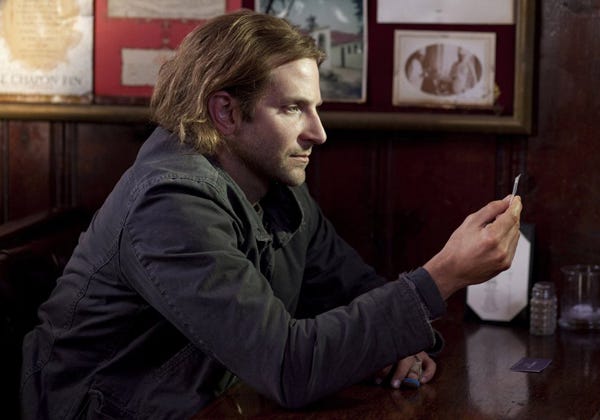Limitless

A darkly comic thriller for statistics majors, “Limitless” revolves around NZT-48. It’s an experimental pill that unlocks the brain’s full potential — a drug that, if not taken regularly once treatment starts, leads to delirium tremens and, eventually, death.
Similarly, “Limitless” needs regular doses of suspended disbelief before it, too, gets the shakes.
For two acts, Leslie Dixon’s shrewd script sometimes suggests our limitations constitute true humanity — that a horizon-less existence is one of true horror. But once Neil Burger’s film overdoses on blood thinner for its slick-but-empty climax, it’s unable to operate such heavy machinery.
Not having read “The Dark Fields,” the source material for “Limitless,” it’s an educated guess that it delved deeper into the drug’s existential ramifications than, say, how it helps one outwit beefy Russian mobsters, mad-money masterminds and a shadow conspiracy.
As a pure ride, though, “Limitless” is palatable and with notable visual panache from Burger (2006’s “The Illusionist”).
Bradley Cooper is Eddie Morra, a divorced “writer” who seems to have gotten a book contract by dint of dating an editorial assistant (Abbie Cornish, given little to do besides resemble a grad-student clone of Nicole Kidman). For the first time since getting stuck in Jennifer Garner’s friend zone on “Alias,” Cooper plays against his likable-asshole archetype, and he reasonably resembles John Cusack’s strung-out, stringy-haired schlub from “Being John Malkovich.”
His rent is as overdue as the first chapter of his novel, his girlfriend bails and a blank Word document torments him for weeks at a time. In saunters Vernon (Johnny Whitworth), Eddie’s former brother-in-law, who sketchily serves up a dose of NZT-48 — which he dubiously claims has been FDA-tested and -approved.
Figuring “why not,” Eddie pops the pill and morphs into the Cooper most audiences know — smooth-talking his way out of eviction from his landlord’s wife, helping her write a law-school paper and gifting her with multiple orgasms all in 45 minutes.
Vernon enlists Eddie as his errand boy in exchange for more pills, but Vernon winds up dead — his apartment ransacked for an NZT-48 stash that Eddie discovers. With a full supply in hand, Eddie is able to recall and recreate, in full, every memory he’s had, every snippet of every story he’s read, every scene of any movie he’s watched.
Eddie picks up the piano, math (i.e., gambling), stock-market patterns, vocabulary that would send even well read viewers to Webster’s, foreign languages and other panty-dropping nuggets of knowledge. He’s like a metrosexual Nate Silver, racking up $2 million in stocks over a week.
However, Eddie takes too much NZT-48 too fast, leading to blackouts and nausea. Though he can never be free of it, Eddie learns he can live on regulated doses. (Here, Dixon hijacks junkie lingo into a juke-and-jive thriller, and “Limitless” occasionally hearkens back to the glitz, and cautionary tone, of 1980s cocaine dramas.)
Soon, wolfish entrepreneur Carl van Loon (Robert De Niro) enlists Eddie’s expertise to assist with a major merger. At least De Niro’s character name clues you in on what to expect from another movie where the scenery is De Niro’s buffet. De Niro does rattle off a terrific monologue about silver-spoons privilege that’s so sinister and velvety that you suspect he scripted it himself.
The deal with van Loon is just one way that Eddie winds up in over his head, outrunning menacing Russian goons (who bankrolled him when he was broke) and a haggard assassin (Tomas Arana), who looks like a hood-rat Carradine cousin.
Burger has visual fun with the alternating clarity and hallucinations brought on by NZT-48 — an almost multidimensional experience of life with fish-eye lens perspectives and dizzying headlong zooms through New York’s neon streets. He also playfully turns the ceiling tiles of Cooper’s ramshackle apartment into stock tickers.
It’s indicative of how “Limitless” really just wants you to go with the flow of the id over ego. After all, if Eddie remembers every movie he’s ever seen, he should know you always pay the thugs from whom you’ve borrowed big bucks.
In the end, it’s a passable pharmacological mystery that plays fast and loose, but never boringly, with the “pharma” and the “logical.”
